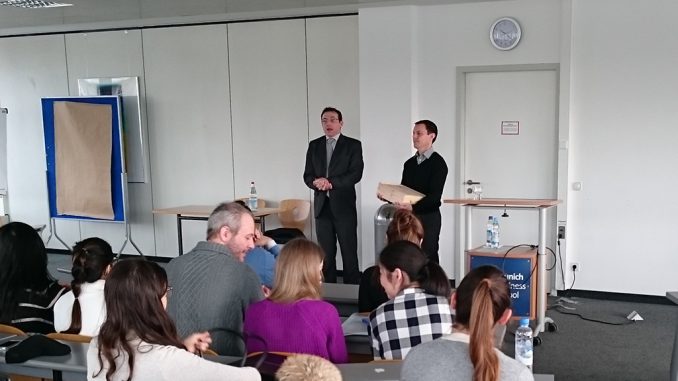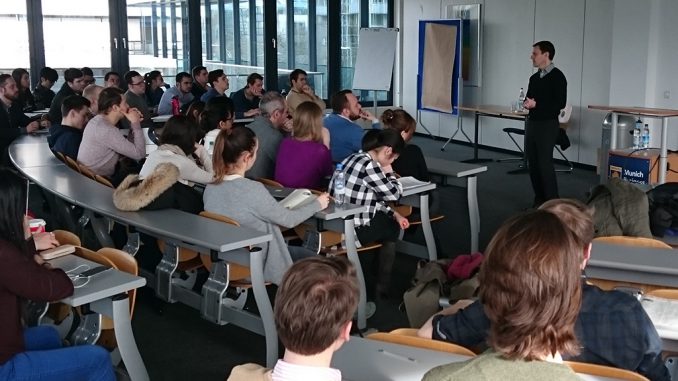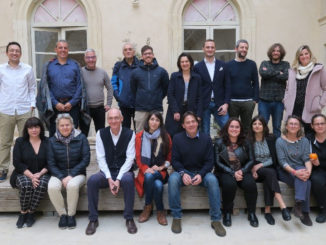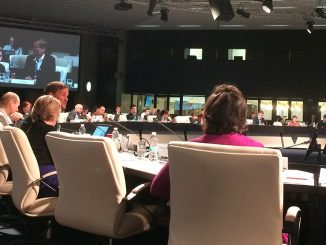
On March 2nd, Mr. Paul Heardman, Her Majesty’s Consul-General for Bavaria and Baden-Württemberg, visited Munich Business School to talk about UK-EU relations providing an insight into the British approach and views as well as answering questions from the MBS students. In his speech, he was able to delve into his experience of having worked at two postings in Brussels and two postings in Germany.
Mr. Heardman’s speech began with a UK historical view on integration and how in 1975 there was a referendum to stay in the then developing EU and how 2016 will be a historical year for the UK as the people will vote to either remain or leave. Although the UK will not join the Euro Zone, what happens within the Euro Zone is crucial for the UK due the trade relations with the EU. These points then formed the basis for the speech and the audience’s questions.
Four key issues in UK’s relationship with the EU
The points that the UK sees as being critical in their relationship with the EU were summarized as revolving around four key issues:
- The first is the UK interest in fairness across the market. The question that was posed was: What is the right relationship between Euro Zone and non-Euro Zone countries?
- The second issue brought up revolves around competitiveness. Mr. Heardman referenced the OECD report showing a decreasing EU market for the next 20 years which raised the question of is Europe still going to be successful in 20+ years?
- The third issue that is crucial to the UK is that of sovereignty. The UK strongly supported a closer union after World War II but today does not seek a closer union. The British view is that a common currency means a need to give up some of the national sovereignty, and that this is not positive for Britain. Further there is the issue of debt levels and tax levels by many Euro Zone countries, which are not viewed positively by the UK.
- The fourth and final key issue was about the hot topic of migration. The view presented by Mr. Heardman is that it is a great achievement of the EU to be able to provide freedom for the people. The citizens are able to move to other countries, start a new life, and work outside their country of citizenship. However, during the last 10 to 20 years there has been an abuse of the social benefits, and this is a hot topic for the citizens of the UK.
The short format is: a skilled worker obtains permission to work in the UK, often in a low level, low skill position, and then obtains immediate access to the social benefits. In other countries a person is required to first pay into the social system before be granted full access to the benefits. The financial strain is not the largest in this case, but it does frustrate the British citizens to see others obtain the same benefits and then leave the country without needing to further pay into the system. A strain on the system (schools, hospitals) was noted by the more than two million people who have entered the UK during the past five years.
 During the Q&A session Mr. Heardman spoke about how the UK leaving the EU is different than a Euro Zone country leaving and that because of the sheer size of the UK market, an interconnection between the two will exist regardless of the outcome, but it is in no one’s interest of the UK to leave. He also stated that the UK wants to attract people to come to the UK.
During the Q&A session Mr. Heardman spoke about how the UK leaving the EU is different than a Euro Zone country leaving and that because of the sheer size of the UK market, an interconnection between the two will exist regardless of the outcome, but it is in no one’s interest of the UK to leave. He also stated that the UK wants to attract people to come to the UK.
It was a great pleasure to be able to welcome Mr. Heardman again and we hope he will be able to return again next year.




